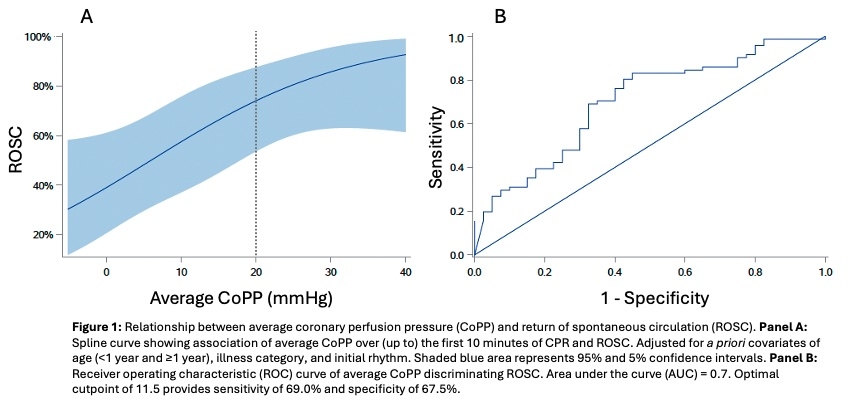Final ID: Su1306
Coronary Perfusion Pressure During Cardiopulmonary Resuscitation is Associated with Event Survival from Pediatric In-hospital Cardiac Arrest
Abstract Body: Introduction
Many animal studies and one adult study establish that coronary perfusion pressure (CoPP) during cardiopulmonary resuscitation (CPR) is associated with survival outcomes, such as return of spontaneous circulation (ROSC). Yet, CoPP during pediatric in-hospital cardiac arrest (pIHCA) has not been investigated.
Hypothesis
We hypothesized that an average CoPP greater than or equal to a priori selected threshold of 20mmHg during (up to) the first 10 minutes of CPR for pIHCA would be associated with higher rates of ROSC.
Methods
We performed a secondary analysis of the ICU-Resuscitation trial, a cluster randomized, step-wedged trial of a physiology-focused quality improvement bundle in pIHCA. Index CPR events among patients ≥37 weeks corrected gestational age and ≤18 years with invasive central venous pressure (CVP) and arterial blood pressure (BP) monitoring were eligible for inclusion. Patients were excluded if they received abdominal CPR. Clinical waveforms were reviewed and periods of CPR with both evaluable CVP and diastolic BP were identified. CoPP was calculated in late “diastole” as the difference between the average of data points occurring between 60% to 70% of the peak-to-peak compression cycle and the time-coincident CVP. The primary exposure was event level average CoPP (≥20mmHg vs <20mmHg) during (up to) the first 10 minutes of CPR. The primary outcome was sustained ROSC ≥20 minutes. Multivariable logistic regression and receiver operating characteristic (ROC) curve and cubic spline analyses evaluated the relationship between CoPP and ROSC and identified an optimal CoPP cutpoint. As a sensitivity analysis, we evaluated whether the frequency of 30-sec epochs during CPR with mean CoPP ≥20mmHg was associated with ROSC.
Results/Data
Among 111 included patients, 71 (65%) achieved ROSC. Thirty (27%) had CoPP ≥20mmHg. Patients with CoPP ≥20mmHg were more frequently ≥1 year of age and less frequently had congenital heart disease. After adjustment for a priori confounders (age [<1 year and ≥1 year], illness category, and initial rhythm), average CoPP ≥20mmHg was associated with ROSC (aRR 1.50 [95% CI: 1.15, 1.96], p=0.003). The proportion of 30-sec epochs during CPR with mean CoPP ≥20mmHg was also associated with ROSC (aRR 1.05 per 10% increase in epochs ≥20mmHg [95% CI: 1.02, 1.08], p=0.001).
Conclusions
In this first investigation of CoPP during CPR for pIHCA, CoPP ≥20mmHg was associated with ROSC.
Many animal studies and one adult study establish that coronary perfusion pressure (CoPP) during cardiopulmonary resuscitation (CPR) is associated with survival outcomes, such as return of spontaneous circulation (ROSC). Yet, CoPP during pediatric in-hospital cardiac arrest (pIHCA) has not been investigated.
Hypothesis
We hypothesized that an average CoPP greater than or equal to a priori selected threshold of 20mmHg during (up to) the first 10 minutes of CPR for pIHCA would be associated with higher rates of ROSC.
Methods
We performed a secondary analysis of the ICU-Resuscitation trial, a cluster randomized, step-wedged trial of a physiology-focused quality improvement bundle in pIHCA. Index CPR events among patients ≥37 weeks corrected gestational age and ≤18 years with invasive central venous pressure (CVP) and arterial blood pressure (BP) monitoring were eligible for inclusion. Patients were excluded if they received abdominal CPR. Clinical waveforms were reviewed and periods of CPR with both evaluable CVP and diastolic BP were identified. CoPP was calculated in late “diastole” as the difference between the average of data points occurring between 60% to 70% of the peak-to-peak compression cycle and the time-coincident CVP. The primary exposure was event level average CoPP (≥20mmHg vs <20mmHg) during (up to) the first 10 minutes of CPR. The primary outcome was sustained ROSC ≥20 minutes. Multivariable logistic regression and receiver operating characteristic (ROC) curve and cubic spline analyses evaluated the relationship between CoPP and ROSC and identified an optimal CoPP cutpoint. As a sensitivity analysis, we evaluated whether the frequency of 30-sec epochs during CPR with mean CoPP ≥20mmHg was associated with ROSC.
Results/Data
Among 111 included patients, 71 (65%) achieved ROSC. Thirty (27%) had CoPP ≥20mmHg. Patients with CoPP ≥20mmHg were more frequently ≥1 year of age and less frequently had congenital heart disease. After adjustment for a priori confounders (age [<1 year and ≥1 year], illness category, and initial rhythm), average CoPP ≥20mmHg was associated with ROSC (aRR 1.50 [95% CI: 1.15, 1.96], p=0.003). The proportion of 30-sec epochs during CPR with mean CoPP ≥20mmHg was also associated with ROSC (aRR 1.05 per 10% increase in epochs ≥20mmHg [95% CI: 1.02, 1.08], p=0.001).
Conclusions
In this first investigation of CoPP during CPR for pIHCA, CoPP ≥20mmHg was associated with ROSC.
More abstracts on this topic:
Comparison of Multimodal High- and Low-Resolution Time Series for ROSC Prediction During CPR Using Machine Learning
Silva Luiz, Menezes Forti Rodrigo, Gaudio Hunter, Padmanabhan Viveknarayanan, Baker Wesley, Morgan Ryan, Kilbaugh Todd, Tsui Fuchiang, Ko Tiffany
Acute Hemodynamic Effects of Sotatercept in Pulmonary Arterial HypertensionKremer Nils, Naeije Robert, Ghofrani Ardeschir, Tello Khodr, Thal Bruno, Janetzko Patrick, Yogeswaran Athiththan, Rako Zvonimir, Pullamsetti Soni, Bonnet Sebastien, Seeger Werner, Grimminger Friedrich

